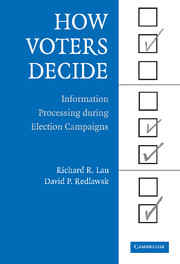Book contents
- Frontmatter
- Contents
- List of Tables and Figures
- Acknowledgments
- HOW VOTERS DECIDE
- I Theory and Methods
- II Information Processing
- III Politics
- 8 Evaluating Candidates
- 9 Voting
- 10 Voting Correctly
- 11 Political Heuristics
- IV Conclusion
- Appendix A Detailed Examples of Decision Strategies in Action
- Appendix B How the Dynamic Information Board Works
- Appendix C Overview of Experimental Procedures
- Appendix D Detailed Decision Scripts
- Appendix E Calculating the On-line Evaluation Counter
- References
- Index
- Titles in the series
9 - Voting
Published online by Cambridge University Press: 05 September 2012
- Frontmatter
- Contents
- List of Tables and Figures
- Acknowledgments
- HOW VOTERS DECIDE
- I Theory and Methods
- II Information Processing
- III Politics
- 8 Evaluating Candidates
- 9 Voting
- 10 Voting Correctly
- 11 Political Heuristics
- IV Conclusion
- Appendix A Detailed Examples of Decision Strategies in Action
- Appendix B How the Dynamic Information Board Works
- Appendix C Overview of Experimental Procedures
- Appendix D Detailed Decision Scripts
- Appendix E Calculating the On-line Evaluation Counter
- References
- Index
- Titles in the series
Summary
Finally we turn our attention to the vote decision itself and the outcome of our election campaigns. This is usually the ultimate goal of voting studies, but for us it is simply a way station along the path. We are fully aware that our campaigns existed only within the confines of our laboratory, and that as a consequence the actual results of the elections (i.e., which candidates received the most votes) are not particularly interesting. We certainly believe the direction of the vote choice matters in actual elections, but as we will argue in the next chapter, the quality of that choice matters, too, and arguably matters more. In any case, our goal in this chapter is quite modest: to simply examine the extent to which knowing about our voters' information processing improves our understanding of how they made their vote choice. We will begin by replicating the kind of voting models that have become standard in the literature, and then we will see if we can do any better by building an explicitly information processing-based model focused on the role of actual information search and acquisition, along with on-line evaluation and (where possible) memory.
WHO WON?
In virtually every extant study of the vote decision, the researcher (and the reader) knows who won the election before the data gathering is complete. Such is not the case for us, and providing that information is actually more complicated than it sounds.
- Type
- Chapter
- Information
- How Voters DecideInformation Processing in Election Campaigns, pp. 184 - 201Publisher: Cambridge University PressPrint publication year: 2006

